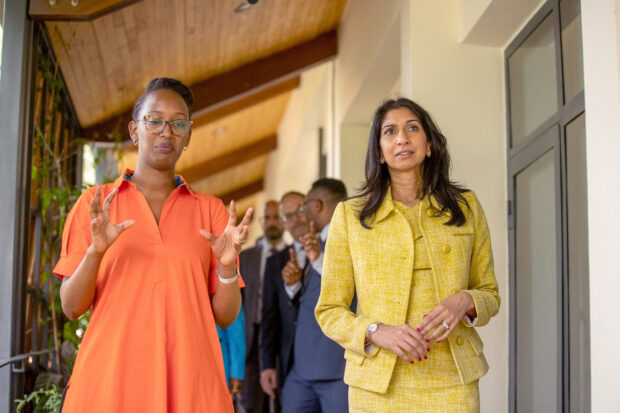Britain defends Rwanda asylum plan as ‘compassionate’

British Home Secretary Suella Braverman meets members of the Norrsken Foundation during her visit to Kigali, Rwanda, March 18, 2023. REUTERS/Stringer
Kigali, Rwanda — Britain’s interior minister defended a controversial plan to deport asylum seekers arriving in the UK to Rwanda during a visit there Saturday, when she inspected the centers where they will be held.
“Many countries around the world are grappling with unprecedented numbers of illegal migrants,” said Suella Braverman.
The agreement between Britain and Rwanda “will lead the way in finding a solution which is both humanitarian and compassionate and also fair and balanced”, she added.
Braverman was speaking after a visit to the Bwiza estate where the center for the resettled migrants is being built, and declared herself “incredibly impressed” with what she had seen.
She spoke to journalists at a news conference attended by Rwanda’s Foreign Minister Vincent Biruta, who also defended the agreement signed between the two countries.
“This will not only help dismantle criminal human-smuggling networks, but also save lives,” he said.
The UK’s conservative government has made tackling illegal immigration a priority, and it was a key promise as the country left the European Union.
It is seeking to outlaw asylum claims by all illegal arrivals and transfer them to “safe” third countries, such as Rwanda, in a bid to stop thousands of migrants from crossing the Channel on small boats.
‘Safe passage, not Rwanda’
More than 45,000 migrants arrived on the shores of southeast England on small boats in 2022 — a 60-percent annual increase on a perilous route that has been used by more people every year since 2018.
Britain’s government, which is trailing in opinion polls, has been striving for years to tackle the crossings.
It had hoped the threat of a one-way ticket to Rwanda, where migrants would remain if accepted for asylum, would deter the cross-Channel journeys.
But that plan, announced by the then prime minister Boris Johnson last year, was blocked at the last minute by the European Court of Human Rights (ECHR), which is separate to the EU.
The government scheme is still mired in appeals in the High Court in London. To date, no deportation flights to Rwanda have taken place.
Rights groups accuse Rwanda — ruled with an iron fist by President Paul Kagame since the end of the 1994 genocide that killed around 800,000 people — of cracking down on free speech and opposition.
In Britain on Saturday, thousands of people took to the streets of cities including London, Glasgow and Cardiff to demonstrate against the plan.
Protesters in the British capital carried signs reading “no human being is illegal” and “Safe passage, not Rwanda”.
Some British media including the BBC and The Guardian newspaper were not invited to cover the interior minister’s visit to Rwanda.